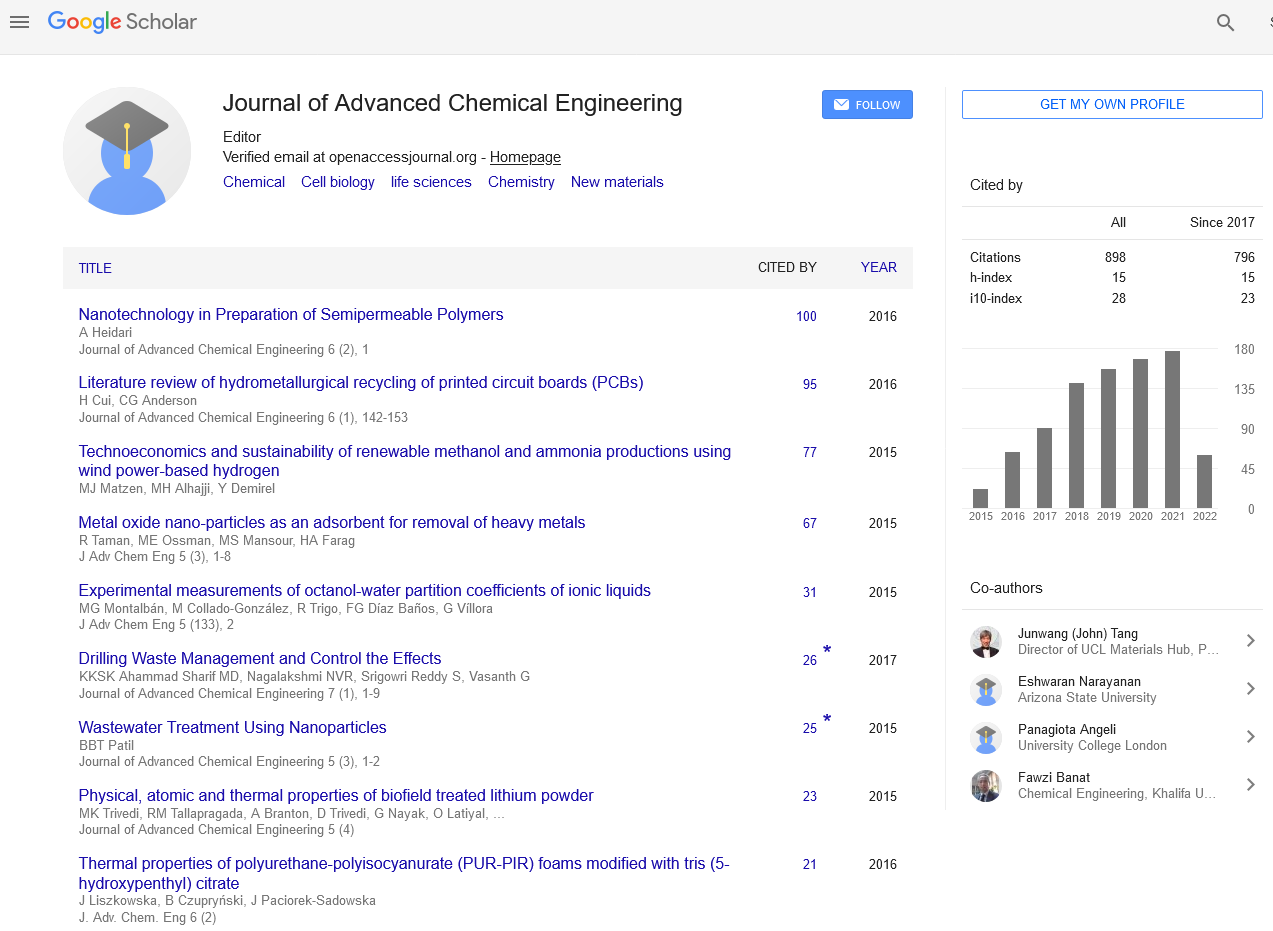Indexed In
- Open J Gate
- Genamics JournalSeek
- Smithers Rapra
- RefSeek
- Directory of Research Journal Indexing (DRJI)
- Hamdard University
- EBSCO A-Z
- OCLC- WorldCat
- Scholarsteer
- Publons
- Geneva Foundation for Medical Education and Research
- Google Scholar
Useful Links
Share This Page
Journal Flyer

Open Access Journals
- Agri and Aquaculture
- Biochemistry
- Bioinformatics & Systems Biology
- Business & Management
- Chemistry
- Clinical Sciences
- Engineering
- Food & Nutrition
- General Science
- Genetics & Molecular Biology
- Immunology & Microbiology
- Medical Sciences
- Neuroscience & Psychology
- Nursing & Health Care
- Pharmaceutical Sciences
A novel bioprocess for value-added products from carbon dioxide and renewable power
6th Asia Pacific Congress on Chemical and Biochemical Engineering
September 17-18, 2018 Hong Kong
Jian Yu
University of Hawaii at Manoa, USA
Keynote: J Adv Chem Eng
Abstract:
Carbon dioxide (CO2) is a prime green-house gas emission from industrial processes. It can be converted into bio-oil by microalgae via conventional photosynthesis. The CO2 fixation rate, however, is quite low and affected by the intermittent solar radiation. Cupriavidus necator, a hydrogen-oxidizing bacterium, was grown on CO2 and H2 in dark gas fermentation to produce single cell proteins and Polyhydroxybutyrate (PHB). Sunlight is captured by photovoltaic modules and immediately converted to H2 as a stable energy source via water electrolysis. The clean H2 and O2 are used by C. necator in CO2 assimilation. Under the chemolithotrophic conditions, the average CO2 uptake rate was 1.2 kg m-3 h-1. The molar ratios of H2/CO2 was 7.3 and the biomass/H2 yield was 1.4 g g-1. The overall energy efficiency from H2 to biomass was 22.4%. Under nutrient control, the PHB content of dry cell mass was 65 wt%. The polymer productivity was 1.87 g L-1 d-1, 14 times higher than oil productivity by a typical bio-oil-producing microalga. PHB is a biodegradable thermoplastic that can find various environmentally friendly applications. The biopolyester can also be converted into small functional chemicals (C3-C4). Specifically, PHB was degraded and deoxygenated on a solid phosphoric acid catalyst, generating a hydrocarbon oil (C6-C18) from which a gasoline-grade fuel (77 wt% oil) and a biodiesel-grade fuel (23 wt% oil) were obtained via distillation. Aromatics and alkenes were the major compounds, depending on the reaction conditions. This work demonstrated a bioprocess through which bioplastics and highgrade liquid fuels can be directly produced from carbon dioxide. The novel bioprocess can be continuously operated regardless the intermittency of renewable powers.
Biography :
Jian Yu has obtained his PhD in1991 from University of British Columbia, MSc from Zhejiang University (1985) and BEng from Zhejiang Institute of Technology (1982). He was an Assistant Professor at Hong Kong University of Science & Technology (1994-2001) and is currently a Research Professor at University of Hawaii at Manoa (2001 to till date). His research interest is in the area of biochemical engineering for production of value-added products from renewable resources. He has published more than 70 research papers in peer-reviewed journal as the first and/or corresponding author, in addition to numerous book chapters and conference papers and presentations. He has three patents that have been licensed to companies and one technology has been successfully scaled up to commercial production.
E-mail: jianyu@hawaii.edu


